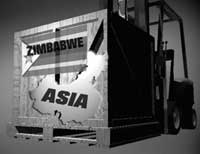Journalists see Zimbabwe’s land crisis up close (FinalCall.com Special Report)

HARARE, Zimbabwe (PANA)–Ostracized by her traditional European trading partners over alleged human rights abuses, Zimbabwe is looking to Asia and other developing countries for new trade opportunities to shore up its sagging economy, although analysts say the switch will take time to bear fruit.
The southern African country is under political and economic siege from powerful Western countries and multilateral bodies such as the World Bank and the International Monetary Fund, over its controversial seizure of farms from white farmers to resettle landless peasants. Western donor nations, led by Britain, the former colonial power, have frozen financial aid to the country since 2000, a move that has since been followed by the World Bank and the IMF.
The result has been a sharp downturn of Zimbabwe’s economy. In 2000, Gross Domestic Product (GDP) contracted by 4.2 percent, by over negative seven percent in 2001 and negative 11.9 percent last year.
Unemployment stands at over 70 percent while inflation has soared to more than 200 percent. Exports, mainly derived from agriculture, have fallen by more than 50 percent in recent years to about $1 billion (U.S.) last year, creating a balance of payment crisis, which has seen Zimbabwe default on its foreign debt repayments and led to shortages of fuel and other essential imports.
With little prospect of a thaw in ties with the West, Zimbabwe has turned to the Asian tiger economies for trade opportunities to help lift its economy from the woods. President Robert Mugabe himself is leading the campaign, capitalizing on warm personal ties with most Asian leaders.
Recently, the Zimbabwean leader led business executives from Harare to stage trade fairs in Thailand and Singapore, two of the Asian countries, which the country has targeted.
“The age-old reflex and tradition of exporting to Europe, which we seek to challenge through this initiative, will be at veritable odds against this endeavor. We need to vindicate it by showing continuous trade and just rewards,” he said when he opened the trade fair in Singapore. “The fiery and beautifully multi-colored entrepreneurial spirit of the tiger surely connects so well with the awesome roar of the African lion in a way destined to make a mark on the world,” said Pres. Mugabe.
Zimbabwe has already signed multi-billion export deals, mainly of agricultural products, with Malaysia, Thailand and Indonesia, but most of them are in abeyance because of drought. With Malaysia, Zimbabwe has even negotiated trade in the local currencies of the two countries.
“It is clear we have to look at each other, at ourselves, to develop markets and to build investments,” Pres. Mugabe said in Singapore. “Until now, we had very modest results to show in this wished-for relationship, where the prospective lovers share the same bed but enjoy different dreams. It would appear now that the time is ripe and this initiative ignites what promises to be the way and direction of future business,” he said.
But analysts say it will take time, if ever possible, for Zimbabwe to escape the trade clutches of Europe, which has been the country’s main trading partner for many years. Britain, for instance, still remains Zimbabwe’s biggest trading partner in the world after South Africa despite the chill in relations between Harare and London over the land reforms.
“Asia offers good prospects, especially for the sort of products (agriculture commodities) which we export, but we cannot replace our traditional markets overnight,” said Andrew Taruvinga, a political analyst at the University of Zimbabwe. “Among other things, we have to learn the traditions and culture of the Asians, as we learned that of the Europeans over time, in order for us to become successful trading partners, and this will take time,” he said.
But Pres. Mugabe says Zimbabwe cannot afford to keep relying on the developed world for trade, and the re-orientation of focus is a matter of national survival. “We dare not jeopardize this seminal initiative through long promises met by short deliveries. Such costly mismatches between promise and delivery erodes confidence, destroys trust without which business cannot take place,” he told Zimbabwean business executives accompanying him on the Asian tour.












